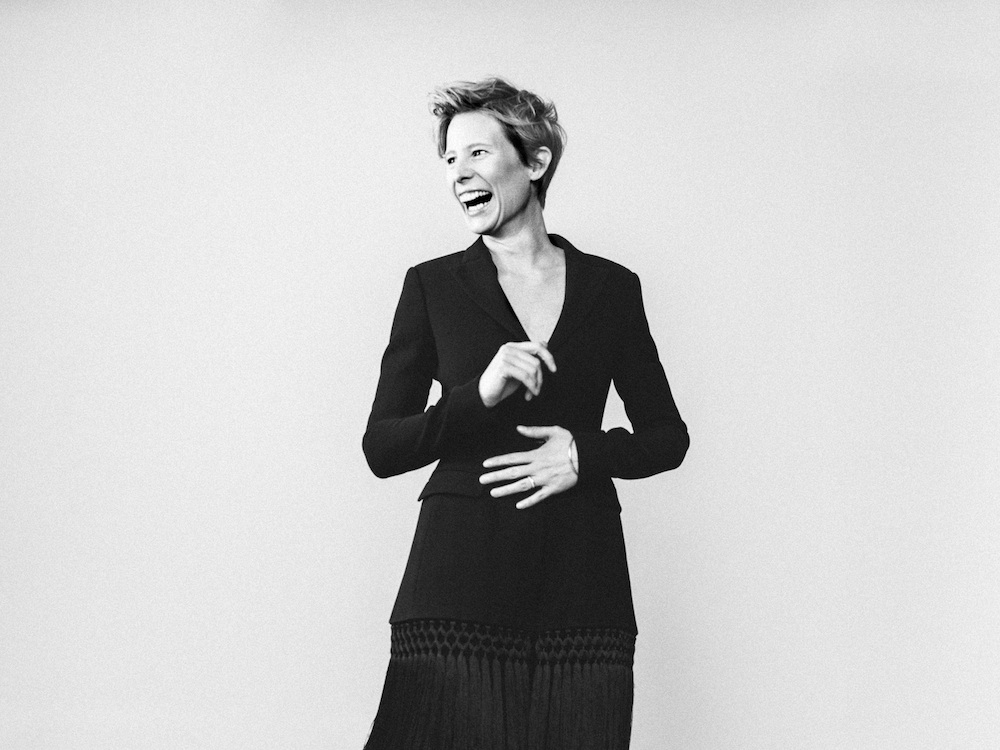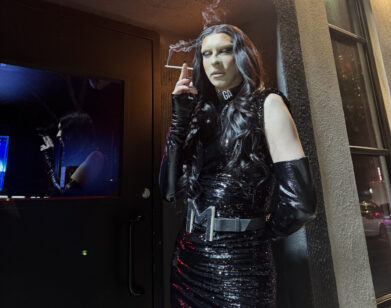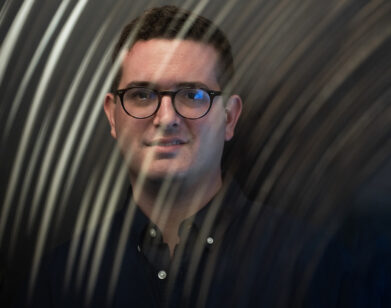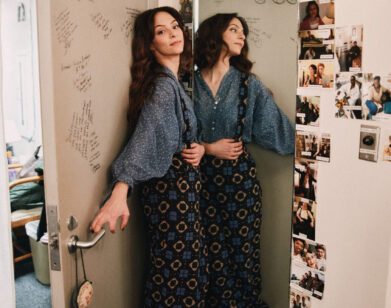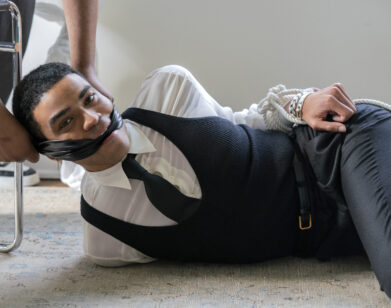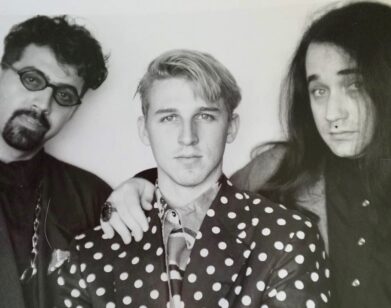The Theater Director
THEA SHARROCK IN NEW YORK: NOVEMBER 2014. PHOTO BY CHRISTOPHER GABELLO. STYLING: NINA STERGHIOU. MAKEUP: STEFANIE WILLMANN FOR RMS BEAUTY AT SEE MANAGEMENT. HAIR: GARETH BROMELL FOR ORIBE HAIR CARE AT SEE MANAGEMENT.
Still in her thirties, Thea Sharrock is one of London’s preeminent theater directors. She’s the woman behind Daniel Radcliffe’s career-changing performance in Peter Shaffer’s Equus and was chosen by Kevin Spacey to direct his one-man show at the Old Vic. She directed Keira Knightley in her stage debut opposite Damian Lewis in The Misanthrope and worked with Tom Hiddleston on Henry V. Her 2010 revival of Terence Rattigan’s After the Dance at the National Theatre won four Laurence Olivier Awards and a Theatre Critics’ Circle Award for Best Director.
This spring, Sharrock will begin work on her first feature film, an adaptation of JoJo Moyes’ novel Me Before You. Sam Claflin and Emilia Clarke are set to star as the two protagonists: Will Traynor, an upper-class man confined to a wheelchair, and Lou Clark, his well-intentioned if inexperienced caregiver. “In many ways it’s a simple love story and in other ways it’s incredibly complex. It’s got a very big and serious issue at the heart of it that is going to be challenging to people and we have to tell that story very carefully,” says Sharrock.
“A film is two years of your life, so it has to grab you from inside and it has to be something that means so much to you that you can’t bear to let it go. When I read this, I had that feeling. I didn’t ever want to let you go,” Sharrock continues. “I feel like I know Will Traynor. I was at school with him. And Lou’s warmth and genuine generosity to other human beings is pretty rare. She’s so selfless, but in a very true way, and I found that very touching.”
EMMA BROWN: What made you choose the theater?
THEA SHARROCK: I guess the bug bit when I was still as school. My mum used to take me to the theater all the time—me asking her to, not her asking me—and I just completely fell in love with it. I had a very important gap year between school and university. I went to South Africa and I worked for six months as general dogsbody just doing anything at the Market Theatre in Johannesburg. Then I came back to London and I got a job at the National Theatre, again for six months. Both of those were administrative jobs, but they allowed me to see behind the scenes, and I met some amazing people. I knew then that it was what I wanted to do. When I got to university, I did a little bit, but really it kicked off after I left and I was an assistant for a while. I was asked to run theaters at quite a young age, which was a real privilege. I ran the Gate [in Notting Hill] for a while, which is where Stephen Daldry started out. They’re magical those places, because there’s no money, so in a way there’re no boundaries and it allows you to be inventive and brave and take risks and all those important things while you’re starting out. From there, I’ve gone from project to project, and gone wherever the work has taken me.
BROWN: Did you grow up in London?
SHARROCK: Yes. I grew up mainly in London but as a kid I grew up in Kenya, because my parents were journalists. I loved it. I haven’t been back there, but I’ve been back to Africa and it feels like home.
BROWN: Do you remember the first play you saw in the theater or the first play that really shook you?
SHARROCK: There were a couple that really stood out. I saw Robert Stephens play King Lear; I’d never seen King Lear before and he was so touching. What I didn’t know at the time was that he was dying of cancer, so his final speeches were so from the heart. I remember having a real physical reaction—an emotional physical reaction. I was maybe 14. Then I also remember seeing Alan Rickman play Hamlet in a tiny theater in London. He was quite a bit older than Hamlet is often played, but as a result he brought just an understanding of life, I guess. He was absolutely brilliant and I remember being again very, very moved. It’s weird because both of them are Shakespeare, and that’s not really my forte. But when Shakespeare doesn’t feel like Shakespeare, it’s the best. Those were big performances for me.
BROWN: Shakespeare is such a big part of theater in England. Was it a conscious decision to not have it be your focus?
SHARROCK: To be honest, no. It was never a conscious decision. I feel very lucky in the projects that have come my way and within that, the Shakespeare that I’ve done I’ve loved doing. Doing Henry V with Tom Hiddleston for Sam Mendes’ company was an amazing privilege, and trying to put Shakespeare on film I think is a really interesting and very difficult thing to do. He writes poetry like no one else, and it’s this amazing place you can always go back to. I really hope that I will do Hamlet one day and I will do King Lear. If in the meantime, you’re lucky enough to get a new play, great.
BROWN: Do you prefer doing new plays when you can?
SHARROCK: I love doing new plays, particularly when the writers are present and willing to work on them. I’ve done a lot of revivals too, which, again, I actually really love doing when the writers are there and are willing to revisit work. I don’t have a particular genre that I want to stick to; if you work on a small piece, you take that experience with you when you work on a big piece and vice versa. You will take those experiences with you and they will make the next one richer.
BROWN: When you first became interested in theatre, was it “maybe I’ll be an actor”?
SHARROCK: No. I did a little bit of acting as a kid and I just knew that I wasn’t great. I knew that that wasn’t where I felt most comfortable, but I knew I wanted to be in the room with the actors. When you’re a kid and you put on plays, I didn’t mind being in them, but what I really liked was telling people, “Just wait a moment and then say the line,” “don’t come in from that door, come in from that door.” And things like that that you don’t really realize. It takes such a particular amazing and extraordinary type of personality to become an actor. I love them. You can’t do my job without them. I’ve worked with a lot of film actors and most of them are so, so prepared in their approach because they are used to turning up ready to shoot: you have to have your performance, you have to have your lines, you have to have everything pretty much decided and ready to go whenever everyone else is ready. It’s really disappointing whenever you get people who don’t behave like that.
BROWN: Do you still go to the theater in your spare time?
SHARROCK: Oh god yeah. You have to. There are times where it’s the last thing you want to do, but there’s nothing like a great piece of theater—a great performance in a great piece of theater. It’s very hard to achieve so it’s not always great; it can be extremely painful.
BROWN: Is it ever reassuring when you see a terrible play: “At least it will never be that bad!”
SHARROCK: It can be reassuring when you know you would’ve done it differently when there are choices that are confusing. [Though] who knows whether it would’ve worked or not. By the same token, the reverse is also true when you see something and you think, “Wow, I could’ve never thought of that—that’s thrilling.” You have that with you and even if you don’t copy it, you have that experience.
BROWN: What made you sign on to direct Me Before You?
SHARROCK: The script. The story. I read the screenplay first and then quickly read the book. I feel very lucky in that I’ve now spent quite a lot of time with JoJo and we’ve really begun to take the book apart in the best possible way in terms of making choices as to how you dramatize the story of these two. It’s very, very exciting. It’s an innately British story.
BROWN: How so?
SHARROCK: I think the class of the characters and their backgrounds, where they come from, says so much about who they are and why and how they have the relationship that they have in a way that is still much more true of England.
BROWN: One moment that really struck me was when Will says, “You would never have let those breasts get so close to me if I weren’t in a wheelchair,” and Lou responds, “You would never have looked at my breasts if you hadn’t been in a wheelchair.”
SHARROCK: “Because I’d be over there serving drinks and you know it.” That moment is the first moment she wrote of the book. She pictured that moment, she felt it was completely real, she understood in that second who those two people were and then she worked backwards from there. That’s the pivotal moment.
BROWN: Do you have a cast now?
SHARROCK: I have my leads, which I’m thrilled about. They’ve never worked together before, so that’s also always a pleasure.
BROWN: Why is that a positive?
SHARROCK: I love working with people I’ve worked with before and that can be true of when people have worked together. But if two people have a natural chemistry and it just works, to be there for the first time, particularly on a story where it’s about these two people meeting for the first time, that goes a long way.
BROWN: When you’re casting, do you focus on an actor’s audition or on their previous work?
SHARROCK: Oh, you have to do quite a bit of research. But I always think you have to do it with a pinch of salt with actors, because it’s so unfair to pigeonhole them and so often they are. I try to be as open as possible and if people are really interested and really want to have a go, then let’s get them in and see them. We saw a huge number of people for this, and a lot of people who it was quite a surprise that they were interested, but they did want to break out of a mould and for some reason this particular story just really spoke to them. Also people grow and change and develop through their experiences, so ultimately you have to go with what’s in the room—the feeling you get from them and what the camera picks up.
BROWN: Lou narrates most of Me Before You, and it can be difficult to capture the intimacy you get through having a first person narrator in a film. Are you going to use voiceovers?
SHARROCK: We thought a lot about that. Have you seen Gone Girl?
BROWN: Yes.
SHARROCK: That was one of the big things that I wanted to see and see how they’d solved that issue. I think with ours it’s much easier to tell it without [voiceovers] and keep it in the immediate first person. I think it’s only the end where you need it. The camera will solve a lot of those problems.
For more from the 15 Faces of 2015, click here.

